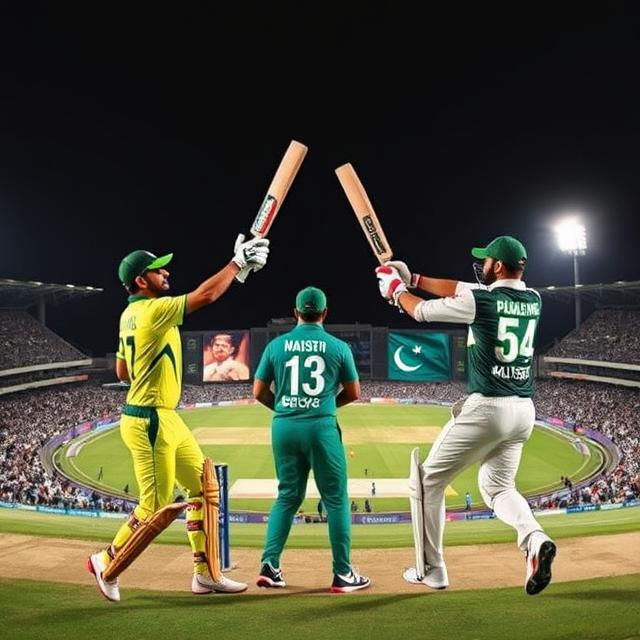The Most Successful Captains in Pakistan Cricket History
The Most Successful Captains in Pakistan Cricket History
Pakistan cricket boasts a rich history, punctuated by periods of immense talent and captivating victories. A crucial element in these triumphs is the leadership provided by the captains. This article delves into the careers of some of Pakistan’s most successful captains, examining their strategies, triumphs, and legacies, to understand what made them stand out from the pack.

Identifying the “most successful” is inherently subjective, as success can be measured in various ways: Number of matches won, World Cup performances, overall impact on the team’s development, or even the sheer excitement and drama surrounding their campaigns. This analysis will consider these multifaceted elements to paint a comprehensive picture of the most impactful leaders in Pakistan’s cricketing journey.
Imran Khan: The Charismatic Crusader
Imran Khan’s captaincy, spanning from the late 1980s to the early 1990s, was a defining era for Pakistan cricket. His aggressive style and outspoken personality captivated fans and sparked a wave of support for the national team. Khan’s leadership extended beyond the field, embodying the spirit of a nation through his passionate approach. His tenure witnessed notable triumphs, including the 1992 Cricket World Cup victory. This landmark victory, achieving success against all odds, solidified his legacy as a visionary leader and a true inspiration.
Analyzing the strategies employed by Imran Khan reveals a blend of aggressive batting, calculated bowling changes, and fostering a strong team spirit. He inspired his team with his relentless pursuit of victory, instilling a sense of belief that transcended individual ambitions. He led the team during a period of transition, paving the way for future generations of Pakistani cricketers to thrive. Beyond the wins, Imran Khan’s captaincy instilled a lasting legacy of passion and grit in the hearts of the Pakistani sporting community.
Javed Miandad: The Stalwart Leader
Javed Miandad, another iconic figure in Pakistan cricket, demonstrated exceptional leadership qualities, particularly in the 1980s. His captaincy epitomized a more cautious yet aggressive approach to the game. Miandad possessed an uncanny ability to read the game, making crucial tactical decisions on the field and guiding his team towards victory. His calm demeanor amidst pressure situations was an invaluable asset. Miandad’s legacy is inextricably linked to his record-breaking performances and the development of a strong, consistent team ethos.
Miandad’s captaincy was characterized by a balanced approach. He understood the importance of nurturing a harmonious team environment, recognizing the strengths of individual players and leveraging them to the team’s overall benefit. His tactical acumen proved crucial in several matches, leading to vital victories that elevated Pakistan’s profile on the world stage. He understood the significance of maintaining a strong mental fortitude in his players.
Other Notable Captains: A Glimpse into Diverse Styles
A comprehensive assessment of Pakistan’s most successful captains necessitates an exploration beyond Imran Khan and Javed Miandad. Other captains, like Wasim Akram and Inzamam-ul-Haq, showcased their unique leadership styles, each with distinct methodologies and philosophies.
Wasim Akram: A whirlwind of pace and an extraordinary all-rounder, Akram’s leadership was often characterized by a dynamic approach to both strategy and team morale. He instilled confidence through his exceptional performances, earning respect through both on-field presence and off-field demeanor.
Inzamam-ul-Haq: Known for his unwavering consistency, Inzamam’s captaincy was deeply rooted in discipline and a firm focus on strategic planning. He established a framework for steady performance and a strong emphasis on consistency.
Misbah-ul-Haq: Misbah-ul-Haq’s captaincy was marked by his patient and meticulous approach. He focused on building the team gradually, placing a profound emphasis on preparation and strategizing. His calm presence under pressure became a significant factor in Pakistan’s improved performances.
Factors Influencing Success: Beyond the Captain
It’s crucial to acknowledge that the success of a captain isn’t solely dependent on their personal skills. The overall performance of a team often depends on several interacting elements. The ability of the team to execute the captain’s plans, the quality and contribution of the supporting staff (coaches, trainers), the individual form of the players, and the team’s ability to cope with pressure all play vital roles in determining the final outcome.
Understanding these factors sheds light on the intricacies involved in achieving success in international cricket.
Modern Era Captains and Their Impact
The modern era of Pakistani cricket presents a fascinating evolution in captaincy styles. The rise of newer leaders brings fresh approaches and a renewed focus on adapting to evolving global trends. Understanding the strengths of the teams in the past is important, but evaluating modern teams based on their performance in international matches is also vital for determining success. Teams like those led by Babar Azam and others represent this evolution. Understanding these nuances is key to comprehending the continuing development and trajectory of Pakistani cricket. Is there a recognizable pattern across the most successful captains, or are their leadership styles entirely unique to their personal experiences?
Conclusion: A Lasting Legacy
The most successful captains in Pakistan cricket history have indelibly shaped the nation’s sporting narrative. Their leadership styles, from charismatic crusaders to meticulous strategists, reflect the diverse personalities and approaches that have defined Pakistan’s cricket journey. From the thrilling victories to the lessons learned from setbacks, each captain leaves behind a significant legacy. The stories of Imran Khan, Javed Miandad, and others offer valuable insights into the multifaceted elements that contribute to the greatness of Pakistan’s cricket team. Their leadership, resilience, and determination continue to inspire future generations of players and fans alike.
Further research could focus on analyzing specific match performances led by these captains, delving into tactical approaches, and evaluating the impact of leadership on player morale and team dynamics. Understanding the cultural context of Pakistan cricket and its connection with national identity would enrich the analysis, providing a deeper insight into the complexities involved in measuring success in this sport.